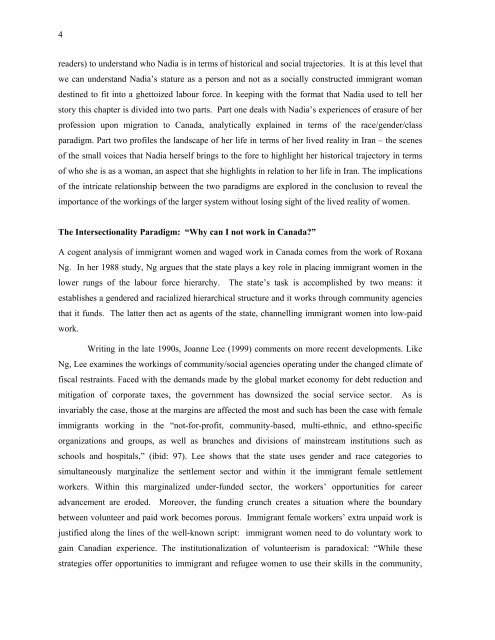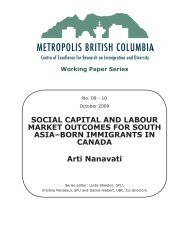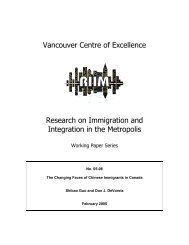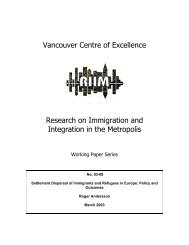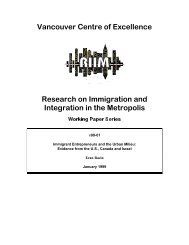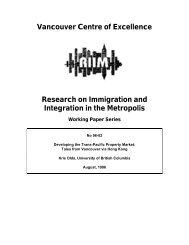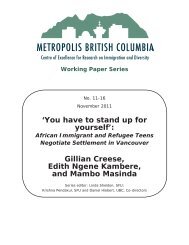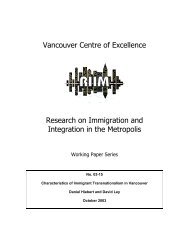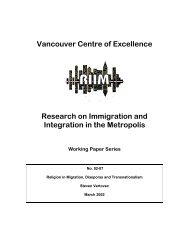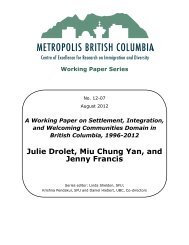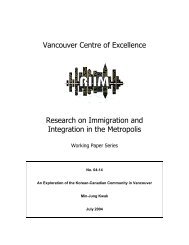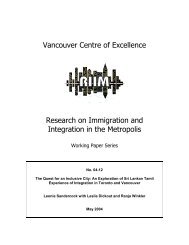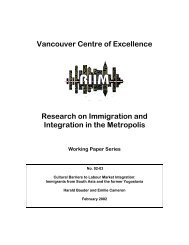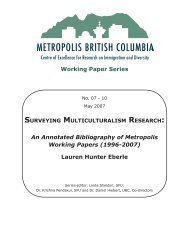Modernization and Global Restructuring of Women's Work
Modernization and Global Restructuring of Women's Work
Modernization and Global Restructuring of Women's Work
Create successful ePaper yourself
Turn your PDF publications into a flip-book with our unique Google optimized e-Paper software.
4<br />
readers) to underst<strong>and</strong> who Nadia is in terms <strong>of</strong> historical <strong>and</strong> social trajectories. It is at this level that<br />
we can underst<strong>and</strong> Nadia’s stature as a person <strong>and</strong> not as a socially constructed immigrant woman<br />
destined to fit into a ghettoized labour force. In keeping with the format that Nadia used to tell her<br />
story this chapter is divided into two parts. Part one deals with Nadia’s experiences <strong>of</strong> erasure <strong>of</strong> her<br />
pr<strong>of</strong>ession upon migration to Canada, analytically explained in terms <strong>of</strong> the race/gender/class<br />
paradigm. Part two pr<strong>of</strong>iles the l<strong>and</strong>scape <strong>of</strong> her life in terms <strong>of</strong> her lived reality in Iran – the scenes<br />
<strong>of</strong> the small voices that Nadia herself brings to the fore to highlight her historical trajectory in terms<br />
<strong>of</strong> who she is as a woman, an aspect that she highlights in relation to her life in Iran. The implications<br />
<strong>of</strong> the intricate relationship between the two paradigms are explored in the conclusion to reveal the<br />
importance <strong>of</strong> the workings <strong>of</strong> the larger system without losing sight <strong>of</strong> the lived reality <strong>of</strong> women.<br />
The Intersectionality Paradigm: “Why can I not work in Canada?”<br />
A cogent analysis <strong>of</strong> immigrant women <strong>and</strong> waged work in Canada comes from the work <strong>of</strong> Roxana<br />
Ng. In her 1988 study, Ng argues that the state plays a key role in placing immigrant women in the<br />
lower rungs <strong>of</strong> the labour force hierarchy. The state’s task is accomplished by two means: it<br />
establishes a gendered <strong>and</strong> racialized hierarchical structure <strong>and</strong> it works through community agencies<br />
that it funds. The latter then act as agents <strong>of</strong> the state, channelling immigrant women into low-paid<br />
work.<br />
Writing in the late 1990s, Joanne Lee (1999) comments on more recent developments. Like<br />
Ng, Lee examines the workings <strong>of</strong> community/social agencies operating under the changed climate <strong>of</strong><br />
fiscal restraints. Faced with the dem<strong>and</strong>s made by the global market economy for debt reduction <strong>and</strong><br />
mitigation <strong>of</strong> corporate taxes, the government has downsized the social service sector. As is<br />
invariably the case, those at the margins are affected the most <strong>and</strong> such has been the case with female<br />
immigrants working in the “not-for-pr<strong>of</strong>it, community-based, multi-ethnic, <strong>and</strong> ethno-specific<br />
organizations <strong>and</strong> groups, as well as branches <strong>and</strong> divisions <strong>of</strong> mainstream institutions such as<br />
schools <strong>and</strong> hospitals,” (ibid: 97). Lee shows that the state uses gender <strong>and</strong> race categories to<br />
simultaneously marginalize the settlement sector <strong>and</strong> within it the immigrant female settlement<br />
workers. Within this marginalized under-funded sector, the workers’ opportunities for career<br />
advancement are eroded. Moreover, the funding crunch creates a situation where the boundary<br />
between volunteer <strong>and</strong> paid work becomes porous. Immigrant female workers’ extra unpaid work is<br />
justified along the lines <strong>of</strong> the well-known script: immigrant women need to do voluntary work to<br />
gain Canadian experience. The institutionalization <strong>of</strong> volunteerism is paradoxical: “While these<br />
strategies <strong>of</strong>fer opportunities to immigrant <strong>and</strong> refugee women to use their skills in the community,


